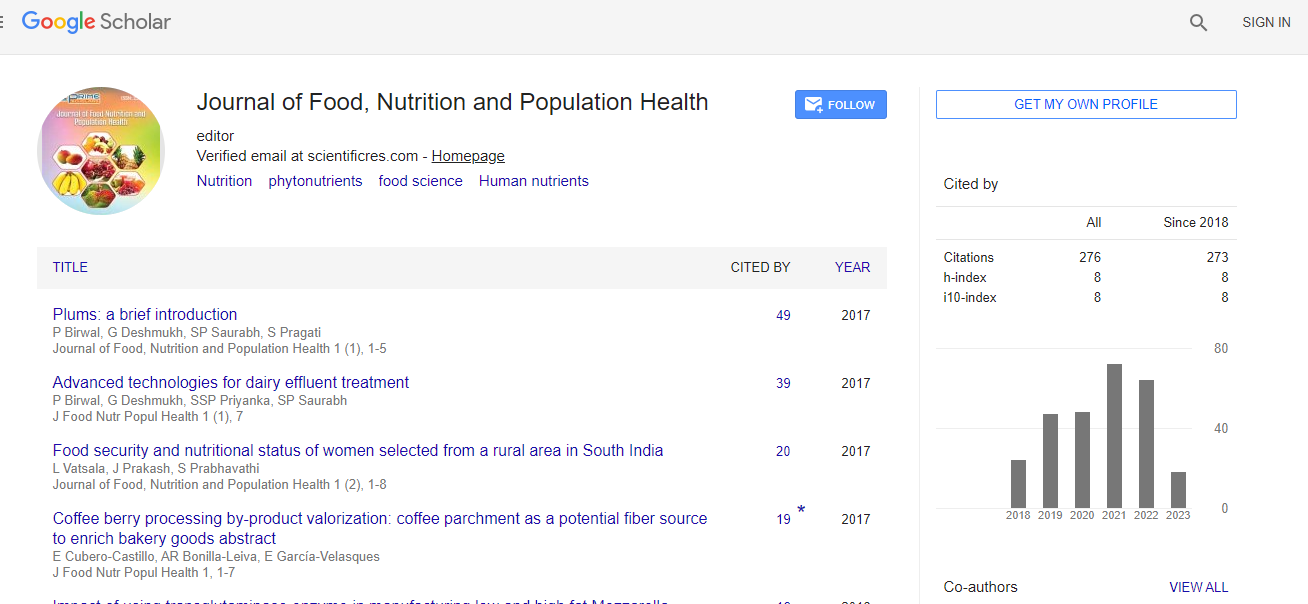Short Communication - (2024) Volume 8, Issue 1
Understanding Malnutrition: Causes, Consequences, and Solutions
William Zen*
Department of Human Sciences, Duke University, USA
*Correspondence:
William Zen,
Department of Human Sciences, Duke University,
USA,
Email:
Received: 28-Feb-2024, Manuscript No. IPJFNPH-24-19932;
Editor assigned: 01-Mar-2024, Pre QC No. IPJFNPH-24-19932 (PQ);
Reviewed: 15-Mar-2024, QC No. IPJFNPH-24-19932;
Revised: 20-Mar-2024, Manuscript No. IPJFNPH-24-19932 (R);
Published:
27-Mar-2024, DOI: 10.21767/2577-0586.8.01.03
Introduction
Malnutrition is a serious health condition that results from an
imbalance between the nutrients an individual consumes and
their body’s nutritional needs. It can manifest in various forms,
including undernutrition, over nutrition, and micronutrient
deficiencies, and it affects individuals of all ages, from infants
to the elderly. Malnutrition poses significant risks to health,
development, and well-being and is a leading cause of
morbidity and mortality worldwide.
Description
Poor dietary intake, characterized by insufficient consumption
of essential nutrients such as proteins, vitamins, and minerals,
is a primary cause of malnutrition. Limited access to nutritious
foods due to poverty, food insecurity, and inadequate food
distribution systems can contribute to dietary deficiencies.
Certain medical conditions, such as gastrointestinal disorders,
infections, and chronic diseases, can impair nutrient absorption,
metabolism, and utilization, leading to malnutrition. Illnessrelated
factors such as reduced appetite, nutrient loss, and
increased nutrient requirements can exacerbate malnutrition
in vulnerable individuals. Environmental factors such as
droughts, floods, and natural disasters can disrupt food
production, distribution, and access, leading to food shortages
and malnutrition. Climate change and environmental
degradation can also impact agricultural productivity and food
security, further exacerbating malnutrition in affected regions.
Malnutrition, particularly during critical periods of growth
and development such as infancy and childhood, can lead to
stunted growth, delayed cognitive development, and long-term
health consequences. Nutrient deficiencies can impair physical
and cognitive function, limiting an individual’s potential and
productivity. Malnutrition weakens the immune system,
making individuals more susceptible to infections, diseases,
and complications. Undernourished individuals are at higher
risk of contracting infectious diseases such as pneumonia,
diarrhea, and tuberculosis, and have poorer outcomes when
they become ill. Malnutrition during pregnancy increases the
risk of maternal complications, preterm birth, low birth weight,
and neonatal mortality. Inadequate maternal nutrition can also
impact fetal development and predispose infants to long-term
health problems later in life. Malnutrition imposes significant
economic and social costs on individuals, families, and societies.
The burden of malnutrition includes healthcare expenditures,
lost productivity, reduced educational attainment, and
intergenerational cycles of poverty and underdevelopment.
Efforts to combat malnutrition should focus on improving
access to diverse, nutritious, and culturally appropriate foods
for all individuals, particularly vulnerable populations such as
children, pregnant women, and marginalized communities.
This may involve interventions such as food assistance
programs, agricultural development initiatives, and nutrition
education campaigns. Strengthening healthcare systems and
nutrition services is essential for early detection, diagnosis, and
management of malnutrition. This includes providing access
to essential healthcare services, nutritional supplements,
therapeutic foods, and micronutrient interventions to prevent
and treat malnutrition-related complications. Addressing
the underlying causes of malnutrition, including poverty,
food insecurity, inadequate sanitation, and limited access
to clean water, is crucial for sustainable solutions. This may
involve implementing policies and programs to promote
economic development, social protection, and environmental
sustainability. Empowering communities and individuals to take
control of their own nutrition and health is key to addressing
malnutrition. This includes promoting breastfeeding and
optimal infant feeding practices, educating caregivers about
nutrition and hygiene, and building capacity for sustainable
agriculture and food production [1-4].
Conclusion
In conclusion, malnutrition is a complex and multifaceted
challenge that requires comprehensive approaches addressing
its underlying causes and consequences. By promoting access
to nutritious foods, strengthening healthcare and nutrition services, and addressing the social determinants of health,
we can work towards eliminating malnutrition and improving
the health and well-being of individuals and communities
worldwide.
Acknowledgement
None.
Conflict Of Interest
The author’s declared that they have no conflict of interest.
References
- Ahn S, Kim WY, Lim KS, Ryoo SM, Sohn CH, et al. (2014) Advanced radiology utilization in a tertiary care emergency department from 2001 to 2010. 9:e112650.
[Crossref] [Google Scholar]
- Raja AS, Mortele KJ, Hanson R, Sodickson AD, Zane R, et al. (2011) Abdominal imaging utilization in the emergency department: Trends over two decades. Int J Emerg Med. 4:19.
[Crossref] [Google Scholar]
- Hryhorczuk AL, Mannix RC, Taylor GA (2012) Pediatric abdominal pain: Use of Imaging in the emergency department in the United States from 1999 to 2007. Radiology. 263:778-85.
[Crossref] [Google Scholar]
- Slovis TL (2003) Children, computed tomography radiation dose, and the as low as reasonably achievable (ALARA) concept. Pediatrics. 112:971-2.
[Crossref] [Google Scholar]
Citation: Zen W (2024) Understanding Malnutrition: Causes, Consequences, and Solutions. J Food Nutr Popul Health. 8:03.
Copyright: © 2024 Zen W. This is an open-access article distributed under the terms of the Creative Commons Attribution Li-
cense, which permits unrestricted use, distribution and reproduction in any medium, provided the original author and source
are credited.

